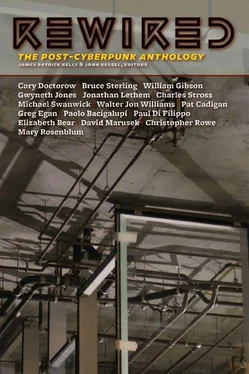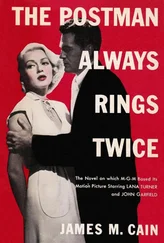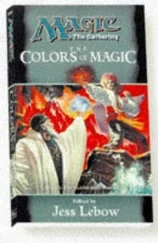Those were the last words she wanted to hear from me. I’m not sure what she said because it’s hard to understand anyone at that volume. There were lots of threats, accusations of jealousy and theft and incompetence on my part, not to mention my blood being tainted by my ancestors’ mating with mutant something-or-others during the period following the Collapse.
I know better than to argue, or even to try to reason with someone in that state. I stepped back and told her she was welcome to her property, I didn’t want it. She gathered it all up in what I think they used to call “high dudgeon.” I’m not quite sure of the term, but I am sure of this: she knew. She knew and she had known probably all along. The anger was to cover the fear of the news getting out, that there was no such band, no such people, no such memory, no such night, ever. Not even theoretically; not even hidden from us by the scarcity of hard information about the world as it was before the Collapse. People get massively harsh about fraudulent pasts and faked memories; the court might let you off with merely a ruinously gargantuan fine and a slap on the wrist, but you’re finished professionally. You can try to go into fiction, but you’ll just get turned away — no one will trust you any more than they would if you had committed plagiarism.
I suppose at that point, I should have felt like I was facing a capital ethical dilemma. After talking it over with Ola and the sidekick, we all decided we didn’t have to face anything at all. We’d all just keep our mouths shut. I wasn’t a doctor, I couldn’t diagnose a medical condition. All I’d done was make a judgment call and canceled the contract with them. They were free to go and I hadn’t even gotten paid for what work I had done. I figured after that, she’d either find an editor who didn’t mind massaging her data, or someone else would tell her she had a naked emperor, so to speak, in her blood.
But, of course, everyone else she approached must have told her the truth about Little Latin Larry — or rather, that they knew the truth. I don’t know how many other people she approached. Maybe only one. Or maybe none; maybe she really became afraid of someone finding out after I did.
I don’t know who did the actual final cut. I suspect it was Carola herself. With so much experience in remakes, she must have picked up enough skills to get by, especially when the work was actually already done for her. Because I know, from what I’ve seen and heard, that The Return of Little Latin Larry is my own rough edit, with some resolution cleaned up. I’ve heard the soundtrack, and I know that’s my re-mastering. I recognize the way Larry sometimes pops his Ps into the microphone.
But I’ve seen stills of the bar and the audience, and those aren’t the people I saw. They’re spliced in very well, morphed enough that no one would recognize them unless she or he had been among them as I had, but it’s not the audience from the purported night. That audience is the original, from the very first Little Latin Larry feature, Rocky’s Roadhouse Presents: Little Latin Larry! It’s OK with me; they were a good audience. Carola’s ancestor must have been in the springtime of his delusions then, and able to imagine, or hallucinate, very strongly.
But as for the rest of it, I have no explanation at all. I don’t know why the damned thing disappears after one session. I know Carola blames me, says that I did something that makes Larry vanish. You’ll notice, however, that I’ve never even been charged with malicious destruction of property. Maybe Carola just doesn’t know how to stabilize blood products properly. I’ve been asked discreetly — i.e., behind Carola’s back — if I’ll analyze a sample, but I’ve refused. I don’t want to know. I suspect it may have something to do with delusions having a shorter shelf-life than real things.
And if that’s so, I don’t want to know. Because what if I have to find out that, say, my man Dylan is actually someone’s delusion and not the man who said that we all had to sing in our chains that everyone must get stoned? Yes, that would be a pretty thorough delusion — but so was Larry. I got all the way into those remakes, that music, those performances. I had a place for them in my mind, and, yeah, in my heart. I feel as robbed as anyone would. It made me think how fragile knowledge can be, especially when you have to glean it from people themselves. Memory recovery is great biotechnology but there’s a need for plain old non-sentient records, the kind of brute hardware that doesn’t have an opinion about everything and doesn’t personalize whatever it touches and records. Something sturdy, too. The kind of thing that can survive the collapse of civilization as we know it and then pop up with, say, accurate maps and —
Well, that’s my new calling. That, and Sky High Theatre. Sky High Theatre is what I’m really excited about. It’s a complete departure from everything I’ve done before. Get this: in Sky High Theatre, there’s one stage, one cast, one performance, which cannot be stopped, paused, or rewound because it is live. And the audience, rather than being individuals within a session rig, are all together in one big room the size of a parking garage, and they sit and watch the live performance without being able to alter it or personalize it in any way. Everyone sees the exact same action at the exact same time.
Don’t laugh. This could catch on.
Kessel to Sterling, 4 June 1986:
“I think your discussion of the novelty of Gibson and the ideational content of this kind of sf is cogent. It strikes me that you and he could do a lot worse than to pursue this line of literary attack. I also agree that sf has open to it opportunities and approaches to writing that are different than those of traditional lit because of sf’s outcast and low-class status, and that these approaches may offer the chance for the production of something genuinely new.
Only time will tell how this will play out. I certainly don’t know. The one thing I do know, however, is that a writer has to follow his own instincts, and I get pretty indignant when somebody presumes to tell me that my honest desire to write what interests me is really just an attempt to toady up to the literary establishment… I do think that there is support for the view that [cyberpunk] is not some wholly new invention exclusive to the sf demimonde…that sf writers, like it or not, are part of the broader world of fiction, though certain kinds of sf may have to be judged by standards different form those of traditional fiction….
A couple of letters ago you said ‘We cannot have it both ways. Either I control my own creations or I don’t.’ I don’t agree with that. We can both control and not control our creations. I’m no Freudian or Marxist. I don’t like any criticism that tells me the writer didn’t know what he was doing. On the other hand, I think it’s futile to deny that many things we don’t intend to express often show up in our work…. Look at the body of work produced in the career of somebody like Heinlein…Starshîp Troopers is both about the virtues of a military social morality and about the eroticism of machines and violence. How can you evaluate one side of this book without acknowledging the other?”
William Gibson
Thirteen Views of a Cardboard City
Though he is the quintessential cyberpunk, the label never encompassed all that William Gibson’s fiction did. Or maybe what Gibson did in his early work was not entirely what people said he was doing. Even at the time he said, “I think that a number of reviewers have mistaken my sense of realism, of the commercial surfaces of characters’ lives, for some deep and genuine attempt to understand technology.” Famously, Gibson wrote Neuromancer on a manual typewriter, and his contribution to Mirrorshades is “The Gernsback Continuum,” which is not about computer hackers slicing into corporate databases, but about “semiotic ghosts” of science fiction past.
Читать дальше












